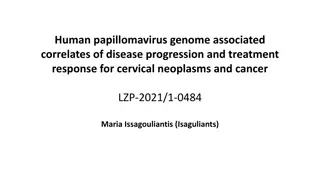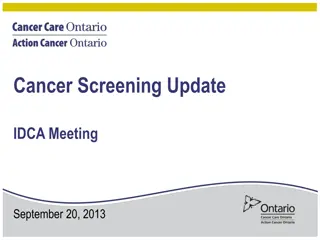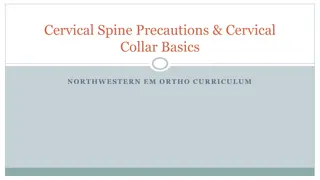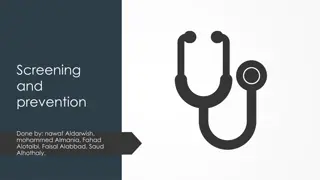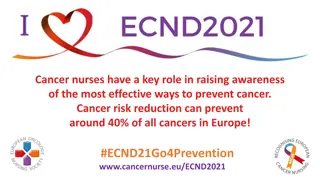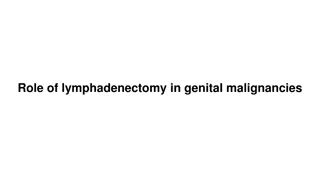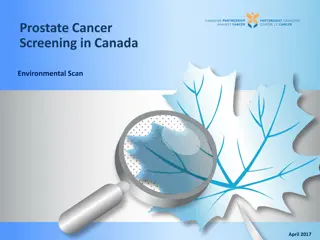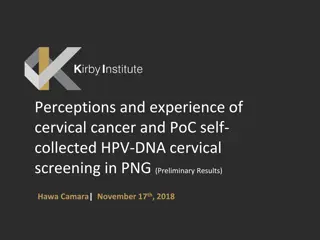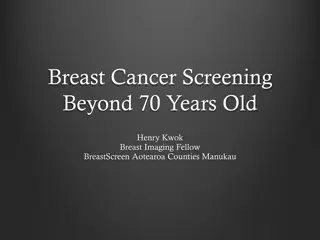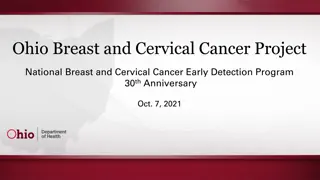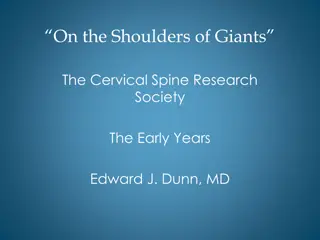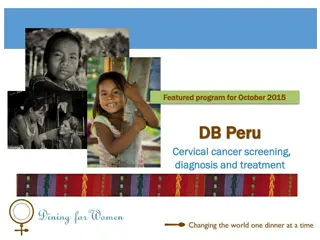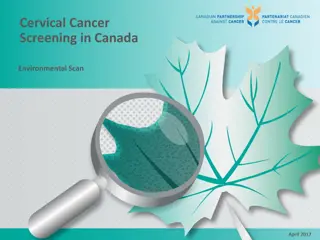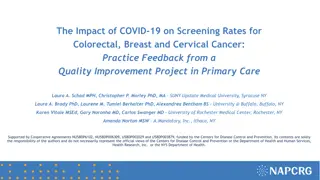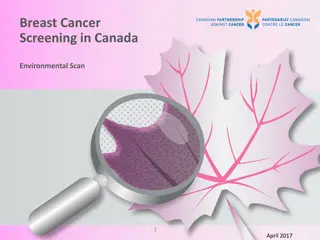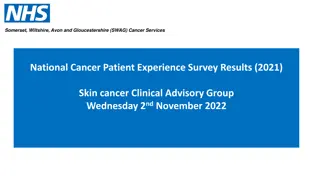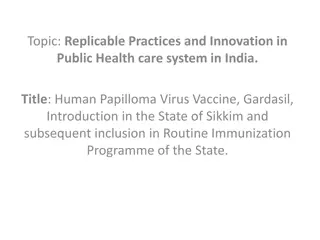Understanding Cervical Screening Test Results
Guidance provides information on understanding the results of cervical screening tests, including primary HPV screening and the significance of positive and negative test results. It also explains the reasons for repeating a sample and the management recommendations based on the test results.
18 views • 16 slides
What you need to know about the HPV Vaccine
Globally, cervical cancer is the fourth most common cancer in women, with 6,04,000 new cases in 2020. Women living with HIV are 6 times more likely to develop cervical cancer, compared to the general population, and an estimated 5% of all cervical cancer cases are attributable to HIV. The contributi
3 views • 7 slides
Understanding Lung Cancer Screening Programs and Criteria
Screening for lung cancer is essential for early detection and intervention. CT scans have shown promise in reducing mortality rates, especially in high-risk populations. While challenges like cost and radiation risk exist, initiatives like the National Lung Screening Trial have demonstrated the eff
4 views • 28 slides
Ensuring Equality of Access to Cervical Screening: Key Considerations
Providing guidance on promoting equality of access to cervical screening, the importance of informed choice, information accompanying screening invitations, and checking for understanding to support individuals making informed decisions. Emphasizes the need for culturally sensitive approaches, espec
5 views • 21 slides
Overview of the NHS Cervical Screening Programme
The NHS Cervical Screening Programme aims to reduce the incidence and mortality of invasive cervical cancer by offering regular screening to eligible individuals. It covers the history, population screening programmes, and key milestones. Learn about the importance, coverage, and guidelines of the p
6 views • 19 slides
Guidance for the training of cervical sample takers
Efficient and accurate cervical screening sample requests are crucial for timely and appropriate patient management. Utilizing the Open Exeter system, sample takers can access pre-populated forms to streamline the process. When deviating from Open Exeter, providing a valid explanation ensures contin
7 views • 13 slides
Europe Cancer Diagnostics Market: Emerging Trends in Liquid Biopsy and Next-Gene
The Europe Cancer Diagnostics Market is projected to reach $12.21 billion by 2031, at a CAGR of 5.6% during the forecast period 2024\u20132031. The Europe cancer diagnostics market is driven by the rising prevalence of cancer, supporting initiatives for early cancer diagnosis, increasing investments
3 views • 4 slides
Investigating Human Papillomavirus Genomes in Cervical Neoplasms
This project focuses on studying the Human Papillomavirus (HPV) genome's association with disease progression and treatment response in cervical neoplasms and cancer. The research aims to genotype high-risk HPVs in healthy and diseased cervix, identify prevalent genotypes, detect genotype drift, cha
1 views • 13 slides
Ontario Breast Cancer Screening Program Overview
The Ontario Breast Screening Program (OBSP) is a quality-assured, population-based breast cancer screening initiative administered by Cancer Care Ontario. It aims to reduce breast cancer mortality through early detection by providing biennial screenings for average-risk women aged 50-74 and annual s
3 views • 21 slides
Cervical Spondylosis: Understanding Symptoms, Evaluation, and Treatment Options
Cervical spondylosis is a degenerative condition of the spine that can lead to neck pain, limited range of motion, and other discomforts. In this case study of an 85-year-old female, the subjective and objective evaluations reveal symptoms and physical findings associated with cervical spondylosis.
1 views • 18 slides
Cervical Spine Precautions & Cervical Collar Basics
Cervical collars, also known as C-Collars, are medical devices worn around the neck to support and immobilize the cervical spine. They are commonly used after trauma or surgery. Trauma patients with blunt traumatic injuries may benefit from C-Collar placement based on clinical judgment. It is import
0 views • 11 slides
Understanding the Cervical Part of Sympathetic Trunks
The sympathetic trunks play a crucial role in the human body, with the cervical part located in front of the transverse processes of cervical vertebrae and the neck of the 1st rib. This part presents three ganglia - superior, middle, and inferior. Sometimes, the inferior cervical and first thoracic
0 views • 25 slides
Comprehensive Guide to Screening and Prevention in Family Medicine
This comprehensive guide explores the definitions, uses, and levels of screening and prevention in family medicine. It covers the criteria for screening tests, types of screening, examples of targeted populations, and approaches to preventing common problems in primary care. The content discusses th
0 views • 73 slides
Empowering Cancer Prevention Through Nurse-Led Initiatives
Cancer nurses play a crucial role in raising awareness about effective cancer prevention methods, supporting the European Code Against Cancer, providing advice for risk reduction, promoting health literacy, and encouraging early diagnosis through screening programs. Their expertise and leadership ar
0 views • 30 slides
Role of Lymphadenectomy in Genital Malignancies
Pelvic and paraaortic lymph node evaluation is crucial in the surgical staging of gynecological malignancies. The goals of lymph node dissection are to determine disease extent and guide further treatment. Pelvic lymph nodes include common iliac, external and internal iliac, obturator, sacral, and p
0 views • 16 slides
Prostate Cancer Screening Guidelines in Canada: A Snapshot of Strategies
The Canadian Partnership Against Cancer annually collects and summarizes data on national, provincial, and territorial prostate cancer screening guidelines and strategies. Despite the absence of organized screening programs, some provinces have policies in place, with opportunistic screening by prim
0 views • 13 slides
Cancer Survival Rates in Europe: Trends and Disparities
Cancer survival rates in Europe have shown variations across different types of cancer and countries. While overall cancer mortality has increased over the years, some countries have experienced declines in mortality rates. Survival rates for breast cancer between 1995-2014 ranged from 74% to 89%, w
0 views • 17 slides
Perceptions and Experiences of Cervical Cancer and PoC Self-Collected HPV-DNA Cervical Screening
Explore the preliminary results of a study on perceptions and experiences of cervical cancer and point-of-care self-collected HPV-DNA cervical screening. The study highlights the need for improved screening services, introduces WHO GeneXpert PoC HPV-DNA technology, and advocates for global cervical
1 views • 25 slides
Understanding Data Submission in Cancer Registry Systems
Data submission in cancer registry systems serves the purpose of contributing to a larger pool of information for monitoring cancer trends, determining patterns, guiding program planning, and assisting public health professionals. Organizations like the State Central Cancer Registries and national p
1 views • 11 slides
Breast Cancer Screening Beyond 70 Years Old Study
This study explores the relevance and effectiveness of breast cancer screening for women aged 70 and above, utilizing data from the Auckland Breast Cancer Registry. It examines demographics, cancer presentation modes, characteristics, and long-term outcomes to address the question of whether screeni
0 views • 32 slides
Humber, Coast and Vale Cancer Alliance - Cancer Champions Programme Overview
The Humber, Coast and Vale Cancer Alliance's Cancer Champions Programme, led by Trish Rawnsley, aims to raise awareness and promote early diagnosis of cancer. Developed in North East Lincolnshire in 2011, the program has trained almost 1,000 individuals, resulting in lower emergency presentations in
0 views • 10 slides
Ohio Breast and Cervical Cancer Project: Providing Critical Services for Ohioans
The Ohio Breast and Cervical Cancer Project (BCCP) celebrates its 30th anniversary by offering crucial screening and diagnostic services for Ohio women at or below 300% of the federal poverty level. The program has seen an increase in the number of women served annually, reaching over 6,000 per year
1 views • 18 slides
Patient Mobility and Cancer: Role of Joint Actions in European Cancer Care
Activities focusing on standardizing cancer care in Europe include quality assurance of screening programs, defining survivorship, establishing Comprehensive Cancer Control Networks, addressing socio-economic inequalities, and promoting public health genomics. The European Cancer Patient Coalition e
0 views • 7 slides
Exploring the Origins and Legacy of the Cervical Spine Research Society
Delve into the early years of the Cervical Spine Research Society, established by pioneers like J. William Fielding, Edward Dunn, and other founding members in 1973. The society aims to foster the exchange of ideas and advancements in the diagnosis and treatment of cervical spine injuries globally.
1 views • 79 slides
Empowering Women in Peru Through Cervical Cancer Screening and Treatment Program
In October 2015, DB Peru launched a program in the Loreto District of Peru to provide cervical cancer screening, diagnosis, and treatment to women in the Lower Napo Valley. Partnering with local communities, the initiative aims to bridge the healthcare gap and improve living conditions. This project
0 views • 8 slides
Improvements in Outcomes for Patients with Early Breast Cancer Over the Past 20 Years
Presenter Carolyn Taylor and team present data on improvements in outcomes for women with early breast cancer from 1993 to 2015 in England. The study highlights patient and tumor factors, breast cancer mortality rates, long-term follow-up data, and the need for big data analysis. The research focuse
0 views • 18 slides
Debunking Common Myths About Cancer and Nutrition
The journey of cancer diagnosis brings forth various challenges, including misconceptions about nutrition. Debunking myths like soy stimulating cancer cells, sugar feeding cancer, and acidic diets curing cancer is crucial for informed decision-making. Evidence shows that soy can be a part of a healt
1 views • 11 slides
Enhancing Cervical Cancer Screening through NHS Cytology Programme
The NHS Cytology Screening Programme aims to reduce incidence and mortality from cervical cancer by offering systematic, efficient screening for pre-malignant diseases. With a history dating back to 1988, the programme targets women aged 25-64, emphasizing the importance of visualizing the cervix an
1 views • 38 slides
Global Cancer Statistics and Trends
The data presented showcases global cancer statistics from various years, highlighting the prevalence of different types of cancer across genders. It includes information on the estimated number of cancer cases, common types of cancers, and trends expected up to 2035. Lung cancer, breast cancer, and
0 views • 83 slides
Screening and Prevention in Family Practice
Definition of screening and prevention in family practice along with the Wilson-Jungner criteria, types of screening tests, and examples like colonoscopy and breast cancer screening. Objectives include understanding screening types and targeted populations, pros and cons of screening, and appropriat
0 views • 33 slides
Integration of Complementary Medicine in Cancer Care in Tuscany
Describes the successful integration of Complementary Medicine in the network of Cancer Departments within the Tuscan Public Healthcare System. The initiative, spearheaded by experts in both Complementary Medicine and medical oncology, has led to the development of Regional Guidelines incorporating
0 views • 4 slides
Understanding Smear Tests for Cervical Cancer Screening
Smear tests, also known as Pap tests, are essential for early detection of cervical cancer. Learn about the procedure, screening guidelines, liquid-based cytology, ideal timing for the test, and what infections it can detect. Stay informed about the importance of regular screenings to safeguard your
0 views • 17 slides
Overview of Cervical Cancer Screening Programs in Canada
The Canadian Partnership Against Cancer conducts an annual environmental scan on cervical cancer screening guidelines and strategies across the country. Organized screening programs are available in most provinces, offering services to asymptomatic women at average risk. This scan provides insights
1 views • 46 slides
Colorectal Cancer Awareness Initiatives in Wyoming
Wyoming's colorectal cancer screening programs and awareness initiatives for February and March 2023 aim to educate and encourage early detection through regular screenings. Updates on program changes and resources, including healthy recipes and the 80% screening pledge, are emphasized. Various medi
0 views • 13 slides
Cancer Types Spending in Europe
Learn about the spending on various types of cancer in Europe including breast cancer, colorectal cancer, prostate cancer, lung cancer, ovary cancer, and pancreatic cancer. The information is based on the Comparator Report on Cancer in Europe 2019, which covers disease burden, costs, and access to m
2 views • 7 slides
Implementation of Flu-FIT Program for Patient Aligned Care Teams at East Orange VA
This study details the adaptation of the Flu-FIT Program to enhance colorectal cancer screening rates within patient aligned care teams at the Veterans Affairs (VA) Department. By linking influenza immunization with colorectal cancer screening using fecal immunochemical testing, the project aimed to
0 views • 10 slides
Impact of COVID-19 on Cancer Screening Rates in Primary Care
This study examines the impact of the COVID-19 pandemic on colorectal, breast, and cervical cancer screening rates in safety-net primary care practices. A 7-year Quality Improvement Project aimed to increase screening rates through tailored education and practice facilitation. The project faced chal
0 views • 5 slides
Breast Cancer Screening Programs and Guidelines in Canada
Organized breast cancer screening programs are available in most provinces and territories in Canada for asymptomatic women at average risk. The screening guidelines recommend mammograms every two years for women aged 50 to 74 or 75, with variations in age acceptance and recruitment methods across r
0 views • 48 slides
SWAG Cancer Services National Cancer Patient Experience Survey Results 2021 Overview
The SWAG Cancer Services National Cancer Patient Experience Survey Results for 2021 provide insights into the experiences of skin cancer patients in Somerset, Wiltshire, Avon, and Gloucestershire. The survey, commissioned by NHS England, aims to monitor progress in cancer care, drive local quality i
0 views • 27 slides
Introduction of Gardasil HPV Vaccine in Sikkim's Routine Immunization Programme
Cervical cancer is a major health issue in Sikkim, India, prompting the introduction of the Gardasil HPV vaccine to address the high prevalence of HPV infections leading to cervical cancer. The state-wide immunization campaign targeted girls aged 9-14, aiming to incorporate the vaccine into the rout
0 views • 10 slides







